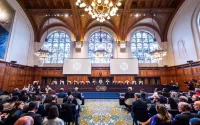Fernand Braudel Center, Binghamton UniversityList of previous commentaries in English and translations in other languagesCommentary No. 163, June 15, 2005
On May 29, 2005, the French voted in a referendum not to ratify the proposed European constitution. Three days later, Dutch voters did the same. In both cases, the margin was solid. Since then, the world press has been filled with discussion about the future of Europe as a vision and as an institution. But the consequences of these votes is in fact extremely ambiguous.
Take the French vote. There were three groups which hailed the vote as a victory: the neo-cons in the United States, large segments of the French left (and particularly the alterglobalists), and rightwing Euroskeptics throughout Europe. In the U.S., William Kristol, editor of the leading journal of the neo-cons, the Weekly Standard, ended his editorial on "A New Europe?" with "Vive la France." The proponents of the "no" on the French left celebrated in the streets of Paris. And rightwing Euroskeptics were delighted at last to win a round in their efforts to derail Europe.
Could they all have been right? Let us see what they were celebrating. For the U.S. neo-cons, the French "no" (and the Dutch "no") were defeats for arrogant, anti-American European elites, and no doubt particularly for the current prime nemesis of the neo-cons, Jacques Chirac. "This is a moment of hope - for the prospects of a strong pro-American, pro-liberty, more or less free-market and free-trade, socially and morally and reinvigorated Europe," said Kristol.
For French alterglobalists, the "no" vote represented quite the opposite - both a rebuff to Anglosaxon conservative values and a rejection of neoliberalism as a program, as incarnated in the proposed Constitution, and as represented by the members of the European Commission and the bureaucracy in Brussels (and represented for them as well by Chirac's government in France). And for the rightwing Euroskeptics, the vote represented a blow against this same Commission and this same Brussels bureaucracy, which stood in their eyes for imposing socialism on Europe. There was also a strong xenophobic element in the French "no" (and even more in the Dutch "no") - a rejection of the possible future admission of Turkey into the European Union, and an attack on the policies that had admitted so many Moslem immigrants into Europe.
Obviously, as in all referenda, the "no" vote put together very different groups with very different objectives. What seems to have provided the additional "no" votes to previous referenda in France were an increased percentage of Socialist and Green voters who were angry about the state of the economy and fearful of further "globalization" - a view they expressed by defeating the treaty. And what seems to have provided the additional "no" votes in the Netherlands is an upsurge of fears about Muslim immigrants in their country caused by recent very notable acts of violence.
Whatever the explanation of the votes, what are the consequences? The "no" votes mean the definitive end of the proposed Constitution, since it required unanimous ratification, and there is zero likelihood that France or the Netherlands will have a second vote to undo the first. This does not, of course, mean the end of institutional Europe. The EU is left with the structure it has. The problem is that the existing structure was considered by most people to be inadequate to the needs of an expanded Europe, and the Constitution was supposed to improve the situation by reducing the need for unanimity in a number of areas, and by creating two central posts (a president and a minister of foreign affairs) to increase political solidity. It may be some time before European governments try again to improve the present institutional structures.
Since one of the main problems that led both to the attempt to write a new Constitution and to the rejection of this very Constitution was the expansion of Europe from 15 to 25 members, further expansion may well be on hold. Bulgaria and Romania were scheduled to join the EU in 2007. The German Christian Democratic Union, presently expected to win the 2006 elections, has already announced that, once in power, they may veto or hold up these adhesions. The chances of Croatia, Macedonia, Ukraine, and of course Turkey to be allowed to join seem even thinner for the moment.
There are those who are quietly happy. One of them is Tony Blair. The French "no" has various positive consequences for him. It saves the United Kingdom from holding its own referendum in 2006 as promised, and therefore a probable public defeat for him. Blair can now contend that he was in favor of the defeated Constitution but that a British referendum is now irrelevant. Furthermore, Blair cannot be unhappy about the rebuff to Chirac (as well as to Schröder in the separate and earlier German regional elections). It is welcome relief from his difficulties at home because of his Iraq policy. Blair may now try to put himself forward now as the leader of Europe.
Kristol's editorial no doubt reflects the mood of the Bush regime. They have been trying for four years to throw a monkey-wrench into a stronger Europe. The rejection of the Constitution and the confusion that it is causing is the first good news they have had in two years on that front. In the long run, Europe will no doubt continue to pull away from U.S. domination but Bush at this point is more concerned with the short run, and in the short run the French "no" is definitely helpful to him.
As for the French alterglobalists, what have they gained? They have demonstrated an increased strength within the family of all those left of center in France. Indeed, the French Socialist party and the Green party are both in turmoil as a result of the vote. There may be important realignments and it is not at all sure that the French rainbow coalition of the left can reconstitute itself in a way that will enable it to win the 2007 presidential elections, especially if the center-right coalition manages to get its act together better than the center-left coalition.
Have the alterglobalists made a major impact on the struggle against neoliberalism in the world-economy? They were already doing well due to the rise of protectionist sentiment throughout the countries of the North (North America, western Europe, east Asia). The vote in France is a reflection of this. But will this vote accelerate the movement? That depends on two things. One is whether the alterglobalists can separate in the popular mind the fight against neoliberalism from the xenophobic, anti-Islamic sentiments that are overtaking much of Europe. And the second is the degree to which the position of the Bush regime continues to erode in the geopolitical arena, and it is therefore unable to capitalize on the setback to European political integration.
Many people in Europe are saying that now is the moment to "start over" in the whole exercise of European unity. The problem from the beginning has been that a more social Europe is not possible unless it is a more federal Europe. But significant segments of the European left (and not only the left in France) have always been afraid that a more federal Europe meant an undermining of the social achievements in their own country. Until the European left is ready to test its strength and fight its fight within a more federal European structure, it is going to go from confused referendum to confused refendum, find itself weakened internally in the struggle to maintain national social achievements, and find Europe unable to play the world geopolitical role vis-à-vis the United States that the European left wishes it to play.






